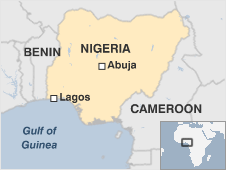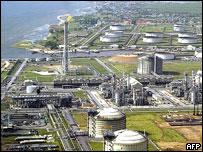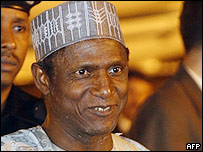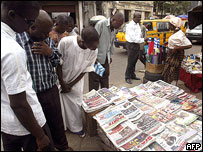 |
After lurching from one military coup to another, Nigeria now has an elected leadership. But it faces the growing challenge of preventing Africa's most populous country from breaking apart along ethnic and religious lines.
Political liberalisation ushered in by the return to civilian rule in 1999 has allowed militants from religious and ethnic groups to express their frustrations more freely, and with increasing violence.
Overview
Thousands of people have died over the past few years in communal rivalry. Separatist aspirations have been growing, prompting reminders of the bitter civil war over the breakaway Biafran republic in the late 1960s.
AT-A-GLANCE
 Politics: People's Democratic
Party (PDP) has dominated since
the return to civilian rule in
1999. President Yar'Adua is
under pressure to fulfil
promises to fight corruption.
Economy: Nigeria is Africa's
leading oil producer; more than
half of its people live in
poverty
International: Nigeria plays
a prominent role in African
affairs; has withdrawn troops
from oil-rich Bakassi peninsula
to settle border dispute with
Cameroon
|
The imposition of Islamic law in several states has embedded divisions and caused thousands of Christians to flee. Inter-faith violence is said to be rooted in poverty, unemployment and the competition for land.
The government is striving to boost the economy, which experienced an oil boom in the 1970s and is once again benefiting from high prices on the world market. But progress has been undermined by corruption and mismanagement.
The former British colony is one of the world's largest oil producers, but the industry has produced unwanted side effects.
The trade in stolen oil has fuelled violence and corruption in the Niger delta - the home of the industry. Few Nigerians, including those in oil-producing areas, have benefited from the oil wealth.
Nigeria is keen to attract foreign investment but is hindered in this quest by security concerns as well as by a shaky infrastructure troubled by power cuts.
Facts
- Full name: The Federal Republic of Nigeria
- Population: 154.7 million (UN, 2009)
- Capital: Abuja
- Largest city: Lagos
- Area: 923,768 sq km (356,669 sq miles)
- Major languages: English (official), Yoruba, Ibo, Hausa
- Major religions: Islam, Christianity, indigenous beliefs
- Life expectancy: 47 years (men), 48 years (women) (UN)
- Monetary unit: 1 Nigerian naira = 100 kobo
- Main exports: Petroleum, petroleum products, cocoa, rubber
- GNI per capita: US $1,160 (World Bank, 2008)
- Internet domain: .ng
- International dialling code: +234
Leaders
President: Umaru Yar'Adua
Umaru Yar'Adua of the ruling People's Democratic Party (PDP) won the presidency following the April 2007 elections which were condemned by local and foreign observers, who alleged widespread vote-rigging.

Umaru Yar'Adua
|
He had served as governor of the remote northern Katsina state since May 1999. A little-known figure in national politics, he was chosen by outgoing President Olusegun Obasanjo as his successor.
He comes from a prominent political family. His father was a minister in the first government after independence and his late elder brother was an army general who served as deputy to President Olusegun Obasanjo when he was Nigeria's military ruler during the 1970s.
When he was elected governor of Katsina in 1999, he immediately declared his assets. In his bid for the presidency he promised to fight corruption.
Mr Yar'Adua's health has been the subject of media speculation and during the election campaign he travelled to Germany for treatment.
He was born in 1951 and was a chemistry teacher until he went into business, then politics, in the 1980s.
Mr Yar'Adua took over from Olusegun Obasanjo, whose election in 1999 came at the end of a period of military rule. Mr Obasanjo won a second term in 2003. A bid to keep him in office for a third term was blocked by parliament.
Mr Obasanjo began his first leadership stint in 1976 after the assassination of Brigadier Murtala Mohamed in a failed coup. In 1979 he earned the distinction of becoming Africa's first modern military leader to hand over power to civilian rule.
Media
Nigeria's media scene is one of the most vibrant in Africa. State-run radio and TV services reach virtually all parts of the country and operate at a federal and regional level. All 36 states run their own radio stations, and most of them operate TV services.

A lively press includes
influential dailies and
popular tabloids
|
Radio is the key source of information for many Nigerians. International broadcasters, including the BBC, are widely listened to. Rebroadcasts of foreign radio stations were banned in 2004.
Private radio and TV stations have been licensed, and there is substantial take-up of pay TV.
Private TV stations in particular are dogged by high costs and scarce advertising revenues. Moreover, legislation requires that locally-made material must comprise 60% of output. Viewing is concentrated in urban areas.
There are more than 100 national and local newspapers and publications, some of them state-owned. They include well-respected dailies, tabloids and publications which champion the interests of ethnic groups. The lively private press is often critical of the government.
Press freedom improved under former President Obasanjo, but restrictive decrees remain.
Media rights body Reporters Without Borders says Nigeria is often a violent place for the press, with journalists suffering beatings, unfair arrests and police raids.
By March 2008, 10 million Nigerians were online (ITU figure).
The press
- The Guardian - influential, privately-owned national daily
- The Champion - Lagos-based daily
- The Daily Times - Lagos-based government daily
- The Punch - privately-owned daily
- New Nigerian - government daily, separate editions in Lagos and Kaduna
- The Daily Independent - Lagos State-based daily
- Daily Trust - Abuja-based daily
- Leadership - Abuja-based daily
- The Comet - private, daily
- Vanguard - Lagos-based, widely-read daily
- This Day - widely-read Lagos-based daily
- The Daily Sun - Lagos-based
- Newswatch - weekly news magazine
- Tell - weekly news magazine
Television
- Nigerian Television Authority (NTA) - state-run, operates scores of national and regional stations; national services broadcast in English
- Degue Broadcasting Network (DBN) - private
- AIT - private, owned by DAAR Communications, broadcasting in Lagos and Abuja and via pan-African satellite service
- Minaj TV - private, serves eastern Nigeria and operates cable and satellite service
- Silverbird TV - private, serves Lagos, Port Harcourt
- Galaxy TV - private, serves western Nigeria
- Channels TV - private
Radio
- Federal Radio Corporation of Nigeria (FRCN) - state-run, operates "Radio Nigeria" stations in Abuja, Lagos, Ibadan, Kaduna, Enugu
- Voice of Nigeria - external service, via shortwave
- Ray Power - private, owned by DAAR Communications, runs music-based and speech-based FM stations
- Freedom Radio - private, based in northern city of Kano
News agency
-
News Agency of Nigeria (NAN) - government-owned
AFRICA | ASIA-PACIFIC | AMERICAS | EUROPE | MIDDLEEAST | SOUTHASIA
Mauritania Mauritius Morocco Mozambique Namibia Niger Nigeria Republic-of-congo Rwanda Sao-tome-and-principe Senegal Seychelles Sierra-leone Somalia South-africa Sudan Swaziland Tanzania The-gambia Togo Tunisia Uganda zambia Zimbabwe Australia Brunei Burma Cambodia China East-timor Fiji Indonesia Japan Kazakhstan Kiribati Kyrgyzstan Laos Malaysia Marshall-islands Micronesia Mongolia Nauru New-zealand North-korea Palau Papua-new-guinea Samoa Singapore Solomon-islands South-korea Taiwan Tajikistan Thailand The-philippines Tonga Turkmenistan Tuvalu Uzbekistan Vanuatu Vietnam Antigua-and-barbuda Argentina Bahamas Barbados Belize Bolivia Brazil Canada Chile Colombia Costa-rica Cuba Dominica Dominican-republic Ecuador El-salvador Grenada Guatemala GuyanaHaiti Honduras Jamaica Mexico Nicaragua Panama Paraguay Peru St-kitts-and-nevis St-lucia St-vincent-and-the-grenadines Suriname Trinidad-and-tobago United-states-of-america Uruguay Venezuela Albania Andorra Armenia Austria Azerbaijan Belarus Belgium Bosnia-hercegovina Bulgaria Croatia Cyprus Czech-republic Denmark Estonia Finland France Georgia Germany Greece Hungary Iceland Ireland Italy Latvia Liechtenstein Lithuania Luxembourg Macedonia Malta Moldova Monaco Montenegro Norway Poland Portugal Russia San-marino Serbia Slovakia Slovenia Spain Sweden Switzerland The-netherlands Turkey Ukraine United-kingdom Vatican Algeria Egypt Iran Iraq Israel-and-palestinian-territories Jordan Kuwait Lebanon Libya Mauritania Oman Saudi-arabia Sudan Syria Tunisia United-arab-emirates Yemen Afghanistan Bangladesh Bhutan India Nepal Pakistan Sri-Lanka The-Maldives

